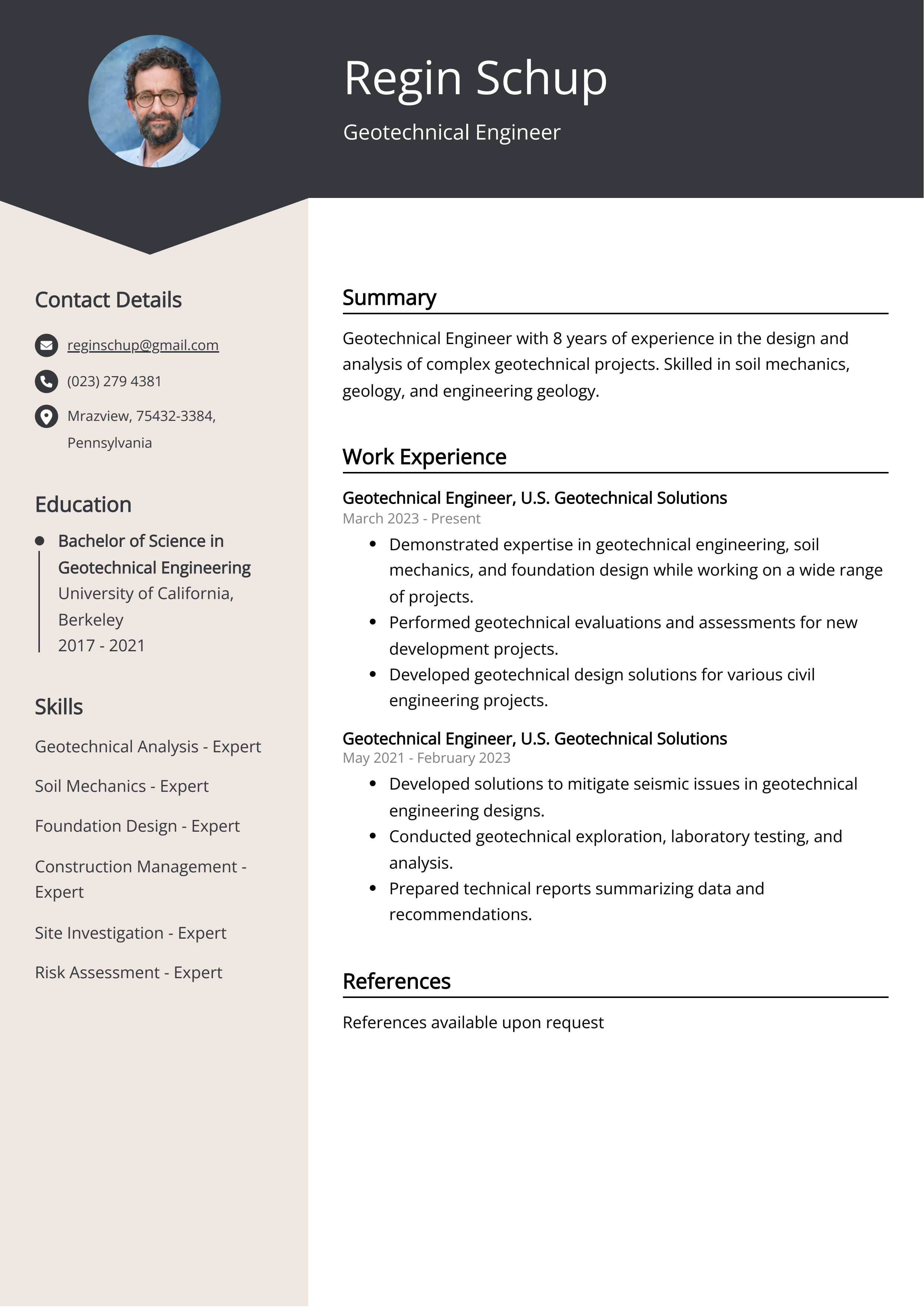The Buzz on Geotheta
The Buzz on Geotheta
Blog Article
The smart Trick of Geotheta That Nobody is Talking About
Table of ContentsThe Facts About Geotheta UncoveredThe Single Strategy To Use For GeothetaThe 3-Minute Rule for GeothetaExcitement About GeothetaThe 8-Minute Rule for Geotheta

They carry out site investigations, gather examples, do laboratory tests, and analyze data to review the viability of the ground for building and construction projects - Engineer of Record. Based upon their findings, geotechnical engineers offer referrals for structure design, slope stability, retaining structures, and reduction of geotechnical threats. They collaborate with various other specialists, such as engineers, architectural engineers, and building teams, to guarantee that geotechnical considerations are incorporated right into the total job design and implementation
By evaluating the behavior and properties of soil and rock, they can identify possible geotechnical dangers such as landslides, soil settlement, or incline instability. Their expertise aids prevent failures or accidents that can endanger lives and building. Here are some detailed obligations and duties of a geotechnical designer: Site Examination: Geotechnical engineers conduct website examinations to collect information on subsurface problems.
They interpret the information to understand the properties and habits of the dirt and rock, including their stamina, permeability, compaction characteristics, and groundwater conditions. Geotechnical Evaluation and Layout: Geotechnical designers evaluate the data accumulated during website examinations to evaluate the security and viability of the site for building projects. They do geotechnical calculations and modeling to examine variables such as birthing capacity, negotiation, slope stability, lateral planet stress, and groundwater flow.
All about Geotheta
Foundation Layout: Geotechnical designers play a critical function in making foundations that can securely sustain the intended framework. They assess the soil problems and load requirements to figure out the appropriate foundation type, such as superficial structures (e.g., footings), deep structures (e.g (https://dzone.com/users/5183482/geotheta.html)., piles), or specialized methods like soil enhancement. They consider variables such as settlement restrictions, bearing capacity, and soil-structure communication to establish optimal structure designs
They assess building and construction plans, screen website activities, and conduct field inspections to confirm that the style referrals are followed. If unforeseen geotechnical concerns develop, they assess the circumstance and offer referrals for remediation or modifications to the layout. Danger Analysis and Reduction: Geotechnical designers evaluate geotechnical threats and threats related to the task website, such as landslides, liquefaction, or soil disintegration.

Collaboration and Interaction: Geotechnical engineers function closely with other specialists associated with a task, such as engineers, structural designers, and building groups. Effective interaction and collaboration are vital to integrate geotechnical factors to consider into the general task design and building and construction process. Geotechnical engineers give technological experience, answer inquiries, and ensure that geotechnical demands are fulfilled.
Facts About Geotheta Revealed
Here are some kinds of geotechnical engineers: Foundation Engineer: Structure designers concentrate on creating and assessing structures for frameworks. They assess the soil conditions, load requirements, and website attributes to establish the most appropriate foundation kind and design, such as superficial structures, deep structures, or specialized methods like stack foundations.
They evaluate the factors affecting slope stability, such as dirt homes, groundwater conditions, and slope geometry, and develop techniques to avoid slope failures and minimize dangers. Earthquake Engineer: Earthquake designers focus on examining and click to investigate creating frameworks to hold up against seismic forces. They evaluate the seismic risk of a site, assess soil liquefaction potential, and develop seismic style criteria to make certain the safety and security and durability of frameworks during quakes.
They execute area testing, accumulate examples, and examine the collected information to characterize the dirt buildings, geologic formations, and groundwater problems at a site. Geotechnical Instrumentation Designer: Geotechnical instrumentation engineers concentrate on surveillance and determining the actions of soil, rock, and frameworks. They set up and maintain instrumentation systems that check aspects such as dirt settlement, groundwater degrees, incline activities, and structural variations to examine performance and supply very early cautions of potential problems.
Little Known Questions About Geotheta.
They perform tests such as triaxial tests, debt consolidation examinations, straight shear examinations, and permeability tests to collect data for geotechnical analysis and layout. Geosynthetics Designer: Geosynthetics engineers focus on the style and application of geosynthetic products, such as geotextiles, geogrids, and geomembranes. They make use of these products to boost dirt security, reinforce slopes, offer drain remedies, and control disintegration.
They tend to be investigatory people, which suggests they're intellectual, introspective, and analytical. They wonder, systematic, sensible, logical, and sensible. Several of them are additionally social, implying they're kind, charitable, cooperative, individual, caring, helpful, empathetic, sensible, and pleasant. Does this seem like you? Take our totally free profession test to discover if geotechnical designer is just one of your top career matches.
In the workplace environment, geotechnical designers use specialized software devices to carry out estimations, produce designs, and examine data. They prepare reports, testimonial task specs, communicate with clients and staff member, and coordinate project tasks. The office setup offers a helpful atmosphere for study, analysis, and collaboration with other specialists associated with the task.
Geotheta Can Be Fun For Everyone
They often check out job sites to conduct site examinations, examine geotechnical conditions, and gather data for analysis. These visits include taking a trip to various locations, sometimes in remote or difficult terrains. Geotechnical designers may do dirt sampling, conduct tests, and screen construction activities to make certain that the geotechnical aspects of the job are being applied correctly.
Geotechnical designers additionally function in specialized geotechnical research laboratories. Geotechnical lab engineers work extensively in these environments, dealing with testing tools, running instruments, and taping information.
Report this page